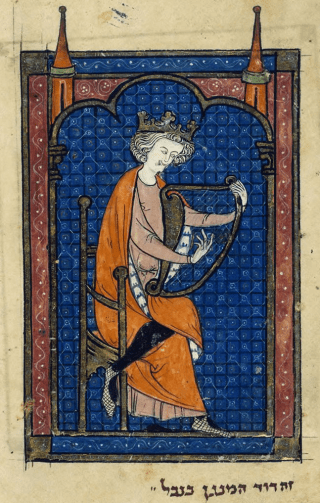 Olivia Schaap is a graduating honors student studying English and Spanish with an interest in writing creative nonfiction. In the future, she hopes to explore the themes of a religious upbringing in an MFA program. This spring, she took the Honors College’s Retro Readings course on the Bible with Dean Lynda Coon.
Olivia Schaap is a graduating honors student studying English and Spanish with an interest in writing creative nonfiction. In the future, she hopes to explore the themes of a religious upbringing in an MFA program. This spring, she took the Honors College’s Retro Readings course on the Bible with Dean Lynda Coon.
If you ever grew up in church or went to Sunday school, you were likely critiqued as I was for misspelling the biblical book “Psalms” once again. It was like a bad anagram for a tree. As a child, I imagined a scene where the Book of Psalms was written by King David while he sat under a palm tree.
This is a quite common attribution – not the palm trees, but authorship by King David. After all, nearly all the psalms contain what is called a superscription, which is similar to a title or attribution. Most of these superscriptions contain obscure and untranslatable Hebrew words that might have been musical directions (since the original psalms were set to music), but nearly every superscription also denotes itself as “a psalm of David.”
Indeed, traditional thought has always seen the ancient King David as the author of the psalms. Psalms translate as “songs of praise,” so it would be appropriate for them to originate from the archetypal musician of the Old Testament himself! However, linguistic and contextual evidence disprove this to modern scholars, and these Davidic superscriptions are interpreted as later additions to the original psalms, meant to link them together and confirm their “divine inspiration from David,” thus granting them religious authority.
In reality, the Book of Psalms is a “collection of collections” of poetic prayers, and not even its 150 works encompasses the entirety of ancient Israel’s psalms. These in the Psalter were preserved because of their liturgical use in the Second Temple period, but the true origin of these works has been lost to obscurity. Most modern scholars believe the psalms were written during the pre-exilic period (around 600 BCE), or possibly post-exilic (∼500 BCE), but they are infamously difficult to date, somewhat because of their poetic nature. Linguistic analysis is usually effective at differentiating between pre-and-post-exilic texts, but struggles with poetry that often uses archaizing language which would be absent in everyday speech.
The second way of dating historical texts, through historical allusions, also fails with Psalms as well. Many references and allusions in the psalms are recognized as being multi-layered and non-specific, thereby making it impossible to link to any one historical event. For example, one sub-categorization of psalms are “royal psalms” that make mention of kings. There are around ten identified royal psalms, but not a single one gives a specific name or mentions an exact king, thus making their context, origin, and date unknowable. Although this phenomenon is aggravating for historians and scholars, it also reflects the beauty of Psalms. They’re untethered to time or space, making them more universal and accessible to many individuals experiencing a range of life circumstances.
But that doesn’t answer our biggest question about psalms: why is it so hard to spell? Well, look no further than the etymology. Our English word psalms comes from the Greek word psalmos, which is a translation of the Hebrew word mizmor, meaning “a song with the accompaniment of a stringed instrument.” It’s the one mystery of the psalms that can be solved. But even if we can’t discern their musical sound, their origin, or their true authorship, we can be grateful to have the preserved beauty of the Psalms’ words. Its emotional poetry and rich storytelling can still resonate with us all today, even if we still can’t spell it.
